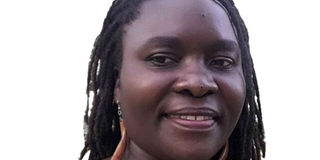We should avoid mixed messages on Covid-19 jabs

Emilly Comfort Maractho
America is dealing with one of the major ironies of life, that ‘maize often grows abundantly in the backyard of those without teeth’.
President Joe Biden is openly frustrated by the millions of Americans who have refused to get vaccinated for protection against Covid-19, with the Delta Variant taking a foothold. His rating has apparently suffered as a result. America is not in want of vaccine doses; some people just will not take the vaccine.
It is hard to believe what seems like foolishness, to refuse to take a vaccine because you believe you may die in two years if you took it, in the face of evidential information that you could die of Covid-19 in two months. This pandemic has had its share of conspiracies, often rapidly flowing through social media.
Earlier, I had to gently tell my friends who fished for conspiracy theories around Covid-19 and flooded my WhatsApp inbox with numerous messages a day to stop.
These ranged from often plausible explanations to outrightly nonsensical ones. There were those that named the driving forces behind Covid-19, the role of big Pharma and international funders like Bill Gates, the impact of Covid-19 on fertility and planting microchips in our bodies and so on, and so on. Many of these had no known authors, date of publication or source of production.
There are good reasons to question things around Covid-19 because of often conflicting information coming from scientists and politicians. Some of it, common sense demands that we must question, because like most things, a pandemic like this works for different people with power who might seek to use it to their advantage. Our quite sense of disbelief demands answers.
Nonetheless, I have finally taken my Covid-19 jab. Every time someone asked me about my vaccination status, they quickly assumed that I was an antivax. Yet, I am not an antivax, I just failed to find the right opportunity to get the jab.
My search for the vaccine several months ago made me realise how we get fed on faulty information that makes us look bad. I had called every centre possible, the vaccine was not there. I even called sources at the Ministry of Health. They told me we were out of vaccines, to be patient ‘because more is coming’.
Yet, there were people discussing on public and social media, how Ugandans are refusing to get vaccinated. Mixed messaging hurts processes like these. Unlike America, where indeed you can say people are refusing to get vaccinated, we have had too few doses to conclude that there is a serious vaccine hesitancy. We may have a perception to that effect, but it is not sufficient to conclude.
I remember someone sending me a passionate appeal not to take any Covid-19 vaccine, with a series of ‘evidential’ information from scientists discussing the numerous dangers of taking the vaccine.
I patiently listened to and read all of them, and had a discussion with the sender, who assured me they rather die of Covid-19 than the vaccine. I still gently told the person that I respected their choice and asked they respect mine to take it, which ended the discussion.
Indeed, this phase, once efforts were stepped up for vaccination, many more people have been vaccinated. There are many factors that hurt vaccination exercises.
Mixed messages are part of it, but not enough supply is the real issue for us here. If you say specific categories will get the vaccine, how do you accuse those you have not been called into the que of hesitancy?
Misinformation is not just about the pandemic or vaccine, but also sending mixed signals. I recently returned to Uganda through Entebbe and at the last check, was asked for my Covid-19 vaccination certificate. I calmly told the lady I did not have one. She was rude and asked me to step aside because they are not allowing those without the card into the country.
Now, I knew that was not true. I refused to step aside and asked her to show me where that information is coming from, and why I was allowed to leave the country without a certificate, and if they expect Ugandans to go get vaccinated out there then return. Eventually she had no answer and let me go. I had my facts, she did not.
We cannot afford to be complacent about what we think people know and what they should know for sure. Getting the right information to the public is very key, and closes gaps in the spread of Covid-19 and uptake of vaccines. Giving people information about why they should do something, and helping them appreciate it is far better than forcing them to take it.
Sometimes we think we have already said something long enough but it is never enough when there is a lot of gray on an issue. Clarifying is what we have to keep doing, to step up efforts. I am glad that I have taken my first does.
Ms Maractho (PhD) is the Director Africa Policy Centre and Senior Lecturer at Uganda Christian University.




